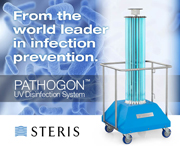
Zack Budryk, FierceHealthcareThe health care industry can learn from the social media response to West Africa's 2014 Ebola outbreak, according to a study published in the American Journal of Infection Control.
|
Michael Hrickiewicz, Health Facilities ManagementA preview of next month's HFM/ASHE/AHE salary survey.
|
Kristin D. Zeit, Healthcare Design"We could make the hospital itself into a treatment for the patient." Now, there’s a design challenge. But it’s one that Emily Landon, infection control epidemiologist for the University of Chicago’s Center for Care and Discovery, hopes that providers, architects, and interior designers will take on in the near future, as she explained to The Wall Street Journal in April.
|
Sara Schoen, Health Facilities ManagementIn partnership with the Better Buildings Challenge, three hospitals diagnosed their energy use and prescribed new ways to improve patient care while saving energy.
|
Peter Teska, Facility ExecutiveCleaning and disinfection programs are an absolute must within health care facilities. The World Health Organization reports that at any given time, of every 100 hospitalized patients, seven in developed countries and 10 in developing countries will acquire at least one health care associated infection.
|
Alexandra Wilson Pecci, HealthLeaders Media Some predictors of patient satisfaction seem obvious, such as good communication between doctors and patients. But a study published in the Journal of Hospital Medicine shows that there are some less obvious predictors that put certain hospitals at a disadvantage for patient experience scoring and, ultimately, for reimbursement.
|
Doug Bradford, LEED AP and Richard Bodo, Facility ExecutiveAfter nearly 10 years of revisions, the ANSI/IICRC S100 Standard and IICRC R100 Reference Guide for Professional Cleaning of Textile Floor Coverings were published in March 2015.
|


Infection Control TodayThere’s an urgent demand for new antimicrobial compounds that are effective against constantly emerging drug-resistant bacteria. Two robotic chemical-synthesizing machines, named Symphony X and Overture, have joined the search.
|
Leslie Small, FierceHealthcareLong before superbug outbreaks tied to a specialized medical scope sickened and killed patients across the country, infection control has been a major priority for hospitals.
|
Infection Control TodayFor years scientists have been aware of the potential problems of antibiotics being present in wastewater, and the research of engineering professor Olya Keen is showing that treatments to clean wastewater may actually be creating new antibiotics and further contributing to the development of antibiotic resistance in the environment.
|
Becker’s Hospital ReviewThe gloves and gowns of healthcare workers are frequently contaminated with methicillin-resistant Staphylococcus aureus when caring for nursing home residents, according to a study published in Infection Control & Hospital Epidemiology.
|
Michelle Bushey RN, MPH, CIC, and Bill Clough, CHESP, Health Facilities ManagementAs the link between environmental transmission of germs and health care-associated infections has become clearer over the past several years, it has helped to build the bonds among environmental services, infection prevention, and nursing professionals who are fighting to keep patients safe.
|
Paul Greenland, CleanLinkAfter reading "The Oz Principle," by Roger Connors, Tom Smith, and Craig Hickman, I wondered how much time I had wasted managing my company "below the line" and how much money this had cost me. Then, I decided to do something about it.
|
Marty Fukuda, EntrepreneurAsk any leaders worth their salt if they’ve ever made management mistakes and you’ll likely get a "is water wet?" type of response. Every leader, young or old, makes their fair share of errors. If you’re lucky, you work with a team and a boss who are forgiving.
|
Ron Segura, CleanLink"Where do I find strong prospects for management positions?" This is a universal question that I am sure you have asked more than once.
|
New Technologies for Surface Cleaning and Disinfection - UV LightThursday, June 18The use of ultraviolet (UV) light technology is rapidly becoming one of the most effective adjunct cleaning technologies in the fight against health care associated infections. Scientists and engineers are continuing to develop this technology as a means to combat pathogens such as MRSA, Ebola, and C-diff in health care facilities. This webinar will explore: 1. How UV light technology is being used as a protocol for surface decontamination; 2. Use guidelines that are currently being developed; and 3. How environmental services leaders can begin to build a business case for the technology.
|
New this year includes a Certified Healthcare Environmental Services Technician Workshop, Express Labs, and exciting pre-conference events. Open registration is available until July 31, 2015.
|
Take part in one of AHE's Train the Trainer workshops and return to your facility prepared to train your environmental services staff to become Certified Healthcare Environmental Service Technicians, CHEST... and start making significant contributions to the patient experience of care, the facility, the profession, and the community!
|
Product Spotlights
|
| |
|

